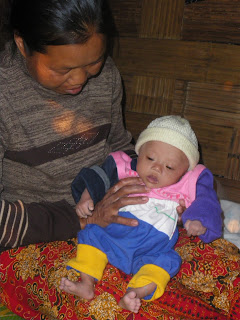Today, while sifting through the news on Irrawaddy and the SHAN Herald, I saw one that struck me. Recently in a staff meeting at Partners, one person lamented the destruction of the new peace agreement already.
You see, on May 19, the Shan State Army and the Union Peacemaking Work Committee (UPWC - the representatives of the Burmese government) came to what I would have called impossible nine months ago: an agreement, not merely to stop fighting as they had decided in December (with many skirmishes anyway), but to begin working toward a new future (see: The 12 Point Agreement). Everyone cheered, and there was a sense of breathless excitement (and also fear that it would all turn out to be a sham, because I think nobody ever loses that fear) among those of us working in Shan State, while waiting to see what the follow through would look like.
Four days later, the follow-through appeared to be more fighting.
And so this staff member lamented that the peace deal lasted a mere three days. That it was over.
Hearing those words really pained me deeply, and I went back to my room that night and remember feeling strongly that we, especially outsiders and guests, could not be the first to give up. If no official media was announcing that the peace agreement had already fallen apart, we had to be those that held it up in the greatest hope. I believe, we must be the last to despair and the first to hope, no matter how audacious, because truly no good can come without hope. That was Monday.
Today, Wednesday, I discovered the unthinkable: an apology from the Burmese Army and a decree that went out to all its troops to cease hostilities toward the SSA. An apology!
Please be as excited as I am about this historic event. It's not perfect, but it's enough to keep hope alive. Nobody is ready to give up on the push for peace in the region, therefore I will not despair.
Maybe, just maybe, the time is coming when we can stand beside our Shan sisters and brothers in every way possible in the enormous efforts of rebuilding communities after decades of war. There's so much work ahead, but I wait expectantly for the day when we will be allowed to begin this work.
You see, on May 19, the Shan State Army and the Union Peacemaking Work Committee (UPWC - the representatives of the Burmese government) came to what I would have called impossible nine months ago: an agreement, not merely to stop fighting as they had decided in December (with many skirmishes anyway), but to begin working toward a new future (see: The 12 Point Agreement). Everyone cheered, and there was a sense of breathless excitement (and also fear that it would all turn out to be a sham, because I think nobody ever loses that fear) among those of us working in Shan State, while waiting to see what the follow through would look like.
Four days later, the follow-through appeared to be more fighting.
And so this staff member lamented that the peace deal lasted a mere three days. That it was over.
Hearing those words really pained me deeply, and I went back to my room that night and remember feeling strongly that we, especially outsiders and guests, could not be the first to give up. If no official media was announcing that the peace agreement had already fallen apart, we had to be those that held it up in the greatest hope. I believe, we must be the last to despair and the first to hope, no matter how audacious, because truly no good can come without hope. That was Monday.
Today, Wednesday, I discovered the unthinkable: an apology from the Burmese Army and a decree that went out to all its troops to cease hostilities toward the SSA. An apology!
Please be as excited as I am about this historic event. It's not perfect, but it's enough to keep hope alive. Nobody is ready to give up on the push for peace in the region, therefore I will not despair.
Maybe, just maybe, the time is coming when we can stand beside our Shan sisters and brothers in every way possible in the enormous efforts of rebuilding communities after decades of war. There's so much work ahead, but I wait expectantly for the day when we will be allowed to begin this work.


